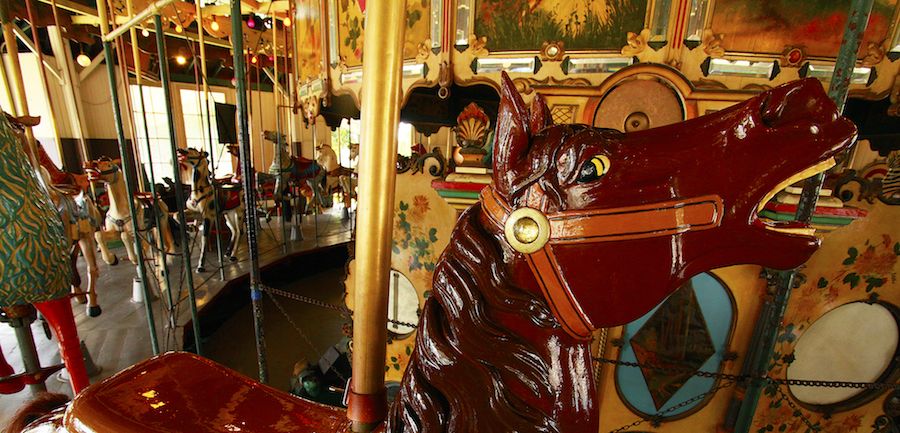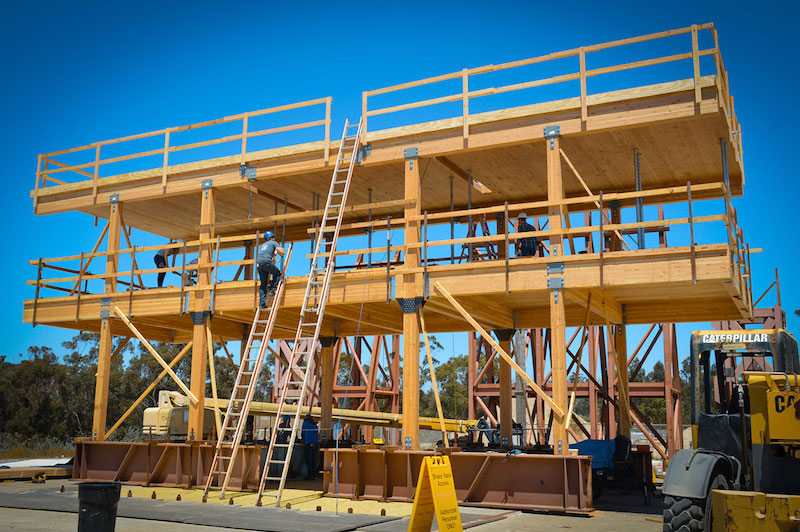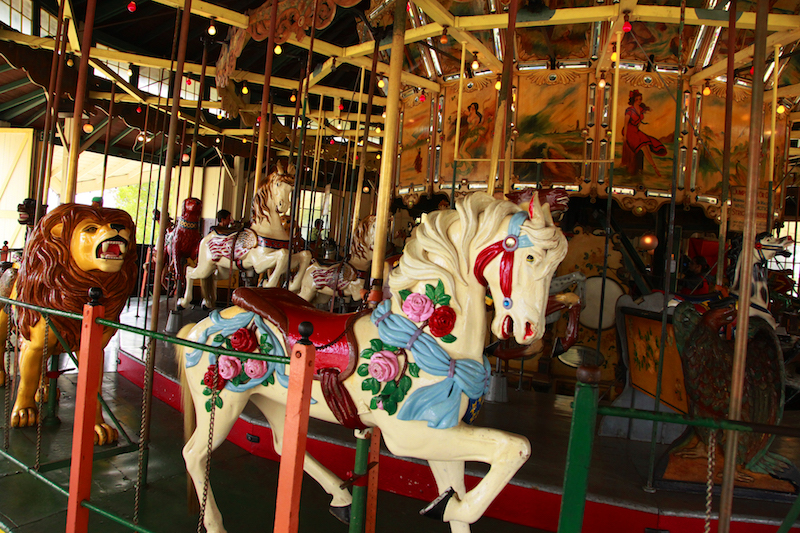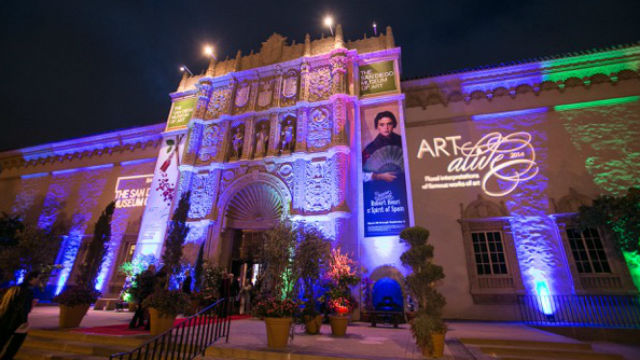Daily Business Report-July 24, 2017
The antique wood menagerie carousel, built in 1910 by the Herschell-Spillman Company of Tonawanda, N.Y., has stood in various locations within Balboa Park since 1922. (Credit: Richard Benton and the Balboa Park Online Collaborative)
Friends of Balboa Park Purchasing
Historic Balboa Park Carousel
By Manny Lopez
The historic Balboa Park carousel is being sold to the Friends of Balboa Park by long-time owner Balboa Park Carousel Inc. headed by La Mesa civil engineer Bill Steen.
Located on the southwest corner of Zoo Place and Park Boulevard, the antique wood menagerie carousel, built in 1910 by the Herschell-Spillman Company of Tonawanda, N.Y., has stood in various locations within Balboa Park since 1922.

“When this opportunity came up, it thrust us into a whole new world because we’ll be managing a historical asset,” said John Bolthouse, executive director of the Friends organization. “We did almost a year of due diligence and we looked at it from all angles and our board of directors determined that this was a great opportunity to partner with the current owner to ensure that it stays in Balboa Park, and that it enables us to be the organization to help preserve and maintain it in perpetuity.”
The sale closed escrow on June 30, 2017, and will enable the nonprofit to maintain uninterrupted operation of the Balboa Park Carousel.
Bolthouse said that the carousel brings in about $250,000 in income, which after expenses will be used to fund park improvement projects. The Balboa Park carousel is one of five throughout San Diego County.
Friends of Balboa Park is kicking off the capital campaign to raise funds for the Carousel on Tuesday, National Carousel Day. Councilmember Chris Ward, Supervisor Ron Roberts as well as numerous other elected officials and community leaders will help celebrate the momentous occasion on Tuesday from 10:30 a.m. to 2 p.m. and free carousel rides from 11 a.m. to 5 p.m.
The colorful, hand-carved, antique carousel, which still has nearly all of its original animals, was awarded the National Carousel Associations’s (NCA) first Historical Carousel Award in 1994. Among the criteria for winning the award is that an owner or support group be likely to ensure the carousel will continue to be available to the public as an operating machine.
_________________

UC San Diego Quake Tests Aimed at Making
Earthquake-Safe Buildings Made of Wood
By Ioana Patringenaru | SDSU News Center
Engineering researchers put a two-story wooden structure through a series of powerful earthquake simulations at the University of California San Diego shake table last week. The goal was to gather the data required to design wood buildings as tall as 20 stories that do not suffer significant damage during large earthquakes.
“Designing buildings that are safe even during large earthquakes is hugely important. We are doing that – and we are going further. We are working to minimize the amount of time buildings are out of service after large earthquakes. We are also focused on cutting the costs required to repair them,” said professor Shiling Pei, an assistant professor at Colorado School of Mines who is leading the tests funded by the National Science Foundation and a variety of industry sponsors. The tests took place on the UC San Diego shake table, the largest outdoor shake table in the world.
Based on the insights gleaned from this current set of tests and related research, the team will return to San Diego in 2020 to build, shake, and ultimately burn an earthquake-resilient 10 story timber building on the UC San Diego shake table.
In the latest tests of the two-story, 22-foot-tall structure, the researchers studied the behavior of full-scale seismic safety systems made from advanced wood materials —including rocking walls, which can rock during a temblor and then re-center back by itself, and innovative seismic safety designs for the structural elements in the building’s floors. The wood is primarily cross-laminated timber (CLT), which is a relatively new, high-performance material made from layers of wood laminate.
“With the arrival of cross-laminated timber, we can start thinking about timber skyscrapers,” said Pei. “CLT and mass timber more generally are part of a massive trend in architecture and construction, but the seismic performance of tall buildings made from these kinds of wood is uncharted waters.”
While some tall wood buildings have been constructed in recent years, they have either been built in areas thought to be seismically inactive or they have been constructed with seismic safety systems made from non-wood-materials such as concrete and steel.
The UC San Diego shake table is part of the Englekirk Structural Engineering Center at the UC San Diego Jacobs School of Engineering.
Current seismic safety building codes aim to ensure human safety in large earthquakes, allowing buildings to stand long enough for occupants to leave unharmed. The building codes, however, don’t necessarily ensure that occupants will actually have a building to return to. Designing buildings that are expected to be back in service soon after a large earthquake, and with minimal repair costs, is known as designing for earthquake resiliency.
“In a large earthquake, the people inside a building may be safe, but if the building frame is crushed, they won’t have a building to return to. We want to improve on that situation,” said Pei.
Resiliency is one of the key tenants of this multi-year research project focused on tall wood buildings using mass timber materials.
“Building owners want to know, after a large earthquake, ‘How many months am I out?’” said Pei. “We want to be able to say to building owners, ‘You’ll be out for a week, and the building will likely just need repairs to a few systems that are designed to be damaged.”
The 22-foot structure being tested this week is a minimalist system aimed at collecting the information required to design tall timber buildings that have this kind of earthquake resilience.
One of the key goals is to study how the different seismic safety systems interact with each other during realistic earthquake simulations.
_________________
County Jobless Rate Rises to 4.3 Percent
Nonfarm employment up 6,400 over the month;
up 27,800 over the year
The unemployment rate in the San Diego County was 4.3 percent in June 2017, up from a revised 3.6 percent in May 2017, and below the year-ago estimate of 4.9 percent, the state Employment Development Department reported. This compares with an unadjusted unemployment rate of 4.9 percent for California and 4.5 percent for the nation during the same period.
Between May and June, total nonfarm employment increased from 1,443,000 to 1,449,400, a gain of 6,400 jobs. Agricultural employment increased by 100 jobs, or 1.1 percent.
The largest over the month job gain was reported in leisure and hospitality (up 5,500). Employment growth was bolstered by accommodation and food services (up 4,000). Arts, entertainment, and recreation increased by 1,500 jobs.
Trade, transportation, and utilities added 900 jobs, with all of gain in transportation and warehousing. Wholesale trade, retail trade, and utilities were unchanged over the month.
Other industries reporting payroll job growth included government (up 700), construction (up 300), manufacturing (up 100), financial activities (up 100), and other services (up 100).
The largest month-over decrease was reported in educational and health services (down 1,200), followed by information (down 100). Within educational and health services, health care and social assistance reported the largest decrease in employment, down 1,100.
Between June 2016 and June 2017, total nonfarm employment increased by 27,800 jobs, or 2.0 percent. Agricultural employment remained unchanged.
Government registered the largest year-over expansion, adding 6,100 jobs. Local government (up 5,200) accounted for 85 percent of the increase. State government contributed to the overall growth with 1,500 jobs, whereas federal government decreased by 600.
Seven other super sectors recorded employment gains, with construction (up 5,700), educational and health services (up 4,600), and other services (up 4,200) reporting the largest gains.
Manufacturing reported the only year-over loss, declining by 300 jobs. Durable goods decreased by 700, while nondurable goods increased by 400.
_________________
Windward Life Care Acquires
Lifeline Care at Home
Windward Life Care, a San Diego company providing services for the elderly, has acquired Lifeline Care at Home. Norman Hannay, Windward’s president, said the company’s wide breadth of services will expand Windward’s home care offerings and improve the lives of more people throughout San Diego County while upholding Lifeline’s reputable standard of care.
“Our expanded footprint positions Windward as premier provider of professional aging services in San Diego,” said Hannay. “With our values aligned, we believe clients will agree that our caliber of care can be transformative for San Diego seniors, and their families.”
With this announcement, Windward will also be able to accelerate and expand educational offerings and partnerships with governmental bodies, nonprofits, and private-sector organizations serving older adults, according to Hannay. He said the acquisition will double Windward’s services and staff to meet the demand of San Diego clients for years to come.
Windward, formerly Elder Care Guides, was founded in 2004.



